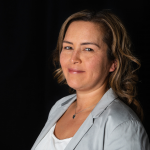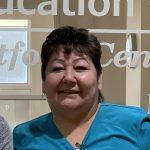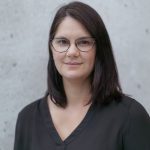Information Box Group
Lori Davis Hill
M.H.Sc - Oneida Wolf - Six Nations
Acting Executive Director

Lori Davis Hill
M.H.Sc - Oneida Wolf - Six Nations
Acting Executive Director
Dr. Bernice Downey
BScN, MA, PhD (Ojibwe-Cree)
Associate Dean, Indigenous Health, Faculty of Health Sciences
Biography
Assistant Professor, School of Nursing and the Department of Psychiatry & Behavioural Neurosciences
Research Interests:
- Indigenous Health
- Health Literacy & Traditional Knowledge
- Harmonization of health systems

Dr. Bernice Downey
BScN, MA, PhD (Ojibwe-Cree)
Associate Dean, Indigenous Health, Faculty of Health Sciences
Dr. Patricia Farrugia
BScN, MD, MSc(HRM) FRCS(C)
Chair of Indigenous Health, Undergraduate MD Program
Integration Foundation Director, Michael G. DeGroote School of Medicine
Orthopaedic Surgeon, Specialty in Foot and Ankle Reconstruction
Assistant Clinical Professor

Dr. Patricia Farrugia
BScN, MD, MSc(HRM) FRCS(C)
Chair of Indigenous Health, Undergraduate MD Program
Integration Foundation Director, Michael G. DeGroote School of Medicine
Orthopaedic Surgeon, Specialty in Foot and Ankle Reconstruction
Assistant Clinical Professor
Dr. Chelsea Gabel
BA, MA, PhD (Métis)
Canada Research Chair in Indigenous Well-being, Community Engagement, and Innovation
Biography
Assistant Professor, Department of Health, Aging & Society; and the Indigenous Studies Program
Chelsea Gabel’s research explores the challenges faced by Indigenous peoples, particularly Indigenous elders and youth that are influenced by changes to traditional Indigenous knowledge and other interconnected health, social, economic, and political processes. Chelsea’s research is typically conducted in partnership with leaders in the community that she is working with. Her community partners help define project research questions, and in turn, the research helps to address issues that they are working with in daily practice.
Traditional interactions among Indigenous elders and youth have been disrupted both by the devastating effects of colonization and residential schools. Working in partnership with Indigenous communities across Canada, Chelsea’s research addresses some of these concerns by considering ways to increase elder-youth relationships and revitalize values related to interactions between different generations.
Chelsea’s research examines how digital technology can be used to leverage and advocate for specific policy and program initiatives in First Nations, Inuit and Métis communities. She draws on photovoice, digital storytelling, e-democracy portals and other arts-based technology and advocacy tools as a means of restoring these relationships. Chelsea works with Indigenous elders and youth to assess how such tools can be used to document, articulate and redress issues related to changes in traditional Indigenous culture.
Overseeing two Social Sciences and Humanities Research Council of Canada (SSHRC) grants as the primary investigator, Chelsea builds on Indigenous and Western ways of knowing and conducting research to address health and well-being in First Nations, Inuit and Métis communities across many generations. She balances academic rigour with a heartfelt desire to ask the kinds of questions that lead to positive social change through public policy.
http://www.digitalimpactfn.com/
Related News
Powerhouse Researchers: Dr. Chelsea Gabel
October 31, 2019
Related Events
Call for Scholarships and Seed Grants – Indigenous Mentorship Network of Ontario Program
January 1, 2019 – 11:00pm

Dr. Chelsea Gabel
BA, MA, PhD (Métis)
Canada Research Chair in Indigenous Well-being, Community Engagement, and Innovation
Dr. Karenna’onwe Karen Hill
M.D, CCFP (Mohawk)
Assistant Professor - Department of Family Medicine
Indigenous Faculty Advisor, IHLL
Biography
Knowledge Translation – Indigenous Learning Lodge
Grass-Roots Indigenous Physicians – Founding Member
Karenna’onwe (Gaw-law-naw-oo-way)– Dr. Karen Hill is a Mohawk physician from Six Nations of the Grand River Territory. She is the mother of two sons and step mother to five daughters. She completed medical school in 2003 and Family Medicine Residency in 2005 – both from McMaster University. Her passion is to see Traditional Indigenous Knowledge return to the centre of life and healthcare for Indigenous people across Canada. This vision led her to co-create a collaborative practice with Traditional Medicine Practitioners at Six Nations called “Juddah’s Place”.
In 2015 Karen became the first recipient of the Thomas Dignan award for Indigenous Health conferred by the Royal College of Physicians and Surgeons. In the same year she also received The College of Family Physicians Excellence Award for leading the way in Indigenous collaborative care in primary practice. Also, in 2016 she was honored by McMaster University with a Community Impact Award.
In early 2020 Karen partnered with Kahsto’serakwathe (Gaw-Stow-say-la-gwa-tay) Paulette Moore – A Mohawk filmmaker to create “The Aunties Dandelion” media and research centre focused on supporting Indigenous embodiment of original instructions embedded in the traditional knowledge. Karen continues to practice consultative medicine at Six Nations and works with her colleague Dr. Amy Montour in the Indigenous Health Service at the Brantford General Hospital. She has completed 4 years apprenticeship in Traditional Indigenous Medicine and continues this learning along with Mohawk language classes as lifelong commitments.

Dr. Karenna’onwe Karen Hill
M.D, CCFP (Mohawk)
Assistant Professor - Department of Family Medicine
Indigenous Faculty Advisor, IHLL
Loretta Loon
Assistant Professor, Indigenous Health Learning Lodge

Loretta Loon
Assistant Professor, Indigenous Health Learning Lodge
Dr. Jennifer Walker
PhD (Haudenosaunee)
Research Development Lead

Dr. Jennifer Walker
PhD (Haudenosaunee)
Research Development Lead
Lori Davis Hill
M.H.Sc - Oneida Wolf - Six Nations
Acting Executive Director
Lori Davis Hill
M.H.Sc - Oneida Wolf - Six Nations
Acting Executive Director
Dr. Bernice Downey
BScN, MA, PhD (Ojibwe-Cree)
Associate Dean, Indigenous Health, Faculty of Health Sciences
Biography
Assistant Professor, School of Nursing and the Department of Psychiatry & Behavioural Neurosciences
Research Interests:
- Indigenous Health
- Health Literacy & Traditional Knowledge
- Harmonization of health systems
Dr. Bernice Downey
BScN, MA, PhD (Ojibwe-Cree)
Associate Dean, Indigenous Health, Faculty of Health Sciences
Biography
Assistant Professor, School of Nursing and the Department of Psychiatry & Behavioural Neurosciences
Research Interests:
- Indigenous Health
- Health Literacy & Traditional Knowledge
- Harmonization of health systems
Dr. Patricia Farrugia
BScN, MD, MSc(HRM) FRCS(C)
Chair of Indigenous Health, Undergraduate MD Program
Integration Foundation Director, Michael G. DeGroote School of Medicine
Orthopaedic Surgeon, Specialty in Foot and Ankle Reconstruction
Assistant Clinical Professor
Dr. Patricia Farrugia
BScN, MD, MSc(HRM) FRCS(C)
Chair of Indigenous Health, Undergraduate MD Program
Integration Foundation Director, Michael G. DeGroote School of Medicine
Orthopaedic Surgeon, Specialty in Foot and Ankle Reconstruction
Assistant Clinical Professor
Dr. Chelsea Gabel
BA, MA, PhD (Métis)
Canada Research Chair in Indigenous Well-being, Community Engagement, and Innovation
Biography
Assistant Professor, Department of Health, Aging & Society; and the Indigenous Studies Program
Chelsea Gabel’s research explores the challenges faced by Indigenous peoples, particularly Indigenous elders and youth that are influenced by changes to traditional Indigenous knowledge and other interconnected health, social, economic, and political processes. Chelsea’s research is typically conducted in partnership with leaders in the community that she is working with. Her community partners help define project research questions, and in turn, the research helps to address issues that they are working with in daily practice.
Traditional interactions among Indigenous elders and youth have been disrupted both by the devastating effects of colonization and residential schools. Working in partnership with Indigenous communities across Canada, Chelsea’s research addresses some of these concerns by considering ways to increase elder-youth relationships and revitalize values related to interactions between different generations.
Chelsea’s research examines how digital technology can be used to leverage and advocate for specific policy and program initiatives in First Nations, Inuit and Métis communities. She draws on photovoice, digital storytelling, e-democracy portals and other arts-based technology and advocacy tools as a means of restoring these relationships. Chelsea works with Indigenous elders and youth to assess how such tools can be used to document, articulate and redress issues related to changes in traditional Indigenous culture.
Overseeing two Social Sciences and Humanities Research Council of Canada (SSHRC) grants as the primary investigator, Chelsea builds on Indigenous and Western ways of knowing and conducting research to address health and well-being in First Nations, Inuit and Métis communities across many generations. She balances academic rigour with a heartfelt desire to ask the kinds of questions that lead to positive social change through public policy.
http://www.digitalimpactfn.com/
Related News
Powerhouse Researchers: Dr. Chelsea Gabel
October 31, 2019
Related Events
Call for Scholarships and Seed Grants – Indigenous Mentorship Network of Ontario Program
January 1, 2019 – 11:00pm
Dr. Chelsea Gabel
BA, MA, PhD (Métis)
Canada Research Chair in Indigenous Well-being, Community Engagement, and Innovation
Biography
Assistant Professor, Department of Health, Aging & Society; and the Indigenous Studies Program
Chelsea Gabel’s research explores the challenges faced by Indigenous peoples, particularly Indigenous elders and youth that are influenced by changes to traditional Indigenous knowledge and other interconnected health, social, economic, and political processes. Chelsea’s research is typically conducted in partnership with leaders in the community that she is working with. Her community partners help define project research questions, and in turn, the research helps to address issues that they are working with in daily practice.
Traditional interactions among Indigenous elders and youth have been disrupted both by the devastating effects of colonization and residential schools. Working in partnership with Indigenous communities across Canada, Chelsea’s research addresses some of these concerns by considering ways to increase elder-youth relationships and revitalize values related to interactions between different generations.
Chelsea’s research examines how digital technology can be used to leverage and advocate for specific policy and program initiatives in First Nations, Inuit and Métis communities. She draws on photovoice, digital storytelling, e-democracy portals and other arts-based technology and advocacy tools as a means of restoring these relationships. Chelsea works with Indigenous elders and youth to assess how such tools can be used to document, articulate and redress issues related to changes in traditional Indigenous culture.
Overseeing two Social Sciences and Humanities Research Council of Canada (SSHRC) grants as the primary investigator, Chelsea builds on Indigenous and Western ways of knowing and conducting research to address health and well-being in First Nations, Inuit and Métis communities across many generations. She balances academic rigour with a heartfelt desire to ask the kinds of questions that lead to positive social change through public policy.
http://www.digitalimpactfn.com/
Related News
Powerhouse Researchers: Dr. Chelsea Gabel
October 31, 2019
Related Events
Call for Scholarships and Seed Grants – Indigenous Mentorship Network of Ontario Program
January 1, 2019 – 11:00pm
Dr. Karenna’onwe Karen Hill
M.D, CCFP (Mohawk)
Assistant Professor - Department of Family Medicine
Indigenous Faculty Advisor, IHLL
Biography
Knowledge Translation – Indigenous Learning Lodge
Grass-Roots Indigenous Physicians – Founding Member
Karenna’onwe (Gaw-law-naw-oo-way)– Dr. Karen Hill is a Mohawk physician from Six Nations of the Grand River Territory. She is the mother of two sons and step mother to five daughters. She completed medical school in 2003 and Family Medicine Residency in 2005 – both from McMaster University. Her passion is to see Traditional Indigenous Knowledge return to the centre of life and healthcare for Indigenous people across Canada. This vision led her to co-create a collaborative practice with Traditional Medicine Practitioners at Six Nations called “Juddah’s Place”.
In 2015 Karen became the first recipient of the Thomas Dignan award for Indigenous Health conferred by the Royal College of Physicians and Surgeons. In the same year she also received The College of Family Physicians Excellence Award for leading the way in Indigenous collaborative care in primary practice. Also, in 2016 she was honored by McMaster University with a Community Impact Award.
In early 2020 Karen partnered with Kahsto’serakwathe (Gaw-Stow-say-la-gwa-tay) Paulette Moore – A Mohawk filmmaker to create “The Aunties Dandelion” media and research centre focused on supporting Indigenous embodiment of original instructions embedded in the traditional knowledge. Karen continues to practice consultative medicine at Six Nations and works with her colleague Dr. Amy Montour in the Indigenous Health Service at the Brantford General Hospital. She has completed 4 years apprenticeship in Traditional Indigenous Medicine and continues this learning along with Mohawk language classes as lifelong commitments.
Dr. Karenna’onwe Karen Hill
M.D, CCFP (Mohawk)
Assistant Professor - Department of Family Medicine
Indigenous Faculty Advisor, IHLL
Biography
Knowledge Translation – Indigenous Learning Lodge
Grass-Roots Indigenous Physicians – Founding Member
Karenna’onwe (Gaw-law-naw-oo-way)– Dr. Karen Hill is a Mohawk physician from Six Nations of the Grand River Territory. She is the mother of two sons and step mother to five daughters. She completed medical school in 2003 and Family Medicine Residency in 2005 – both from McMaster University. Her passion is to see Traditional Indigenous Knowledge return to the centre of life and healthcare for Indigenous people across Canada. This vision led her to co-create a collaborative practice with Traditional Medicine Practitioners at Six Nations called “Juddah’s Place”.
In 2015 Karen became the first recipient of the Thomas Dignan award for Indigenous Health conferred by the Royal College of Physicians and Surgeons. In the same year she also received The College of Family Physicians Excellence Award for leading the way in Indigenous collaborative care in primary practice. Also, in 2016 she was honored by McMaster University with a Community Impact Award.
In early 2020 Karen partnered with Kahsto’serakwathe (Gaw-Stow-say-la-gwa-tay) Paulette Moore – A Mohawk filmmaker to create “The Aunties Dandelion” media and research centre focused on supporting Indigenous embodiment of original instructions embedded in the traditional knowledge. Karen continues to practice consultative medicine at Six Nations and works with her colleague Dr. Amy Montour in the Indigenous Health Service at the Brantford General Hospital. She has completed 4 years apprenticeship in Traditional Indigenous Medicine and continues this learning along with Mohawk language classes as lifelong commitments.
Loretta Loon
Assistant Professor, Indigenous Health Learning Lodge
Loretta Loon
Assistant Professor, Indigenous Health Learning Lodge
Dr. Jennifer Walker
PhD (Haudenosaunee)
Research Development Lead
Dr. Jennifer Walker
PhD (Haudenosaunee)
Research Development Lead
